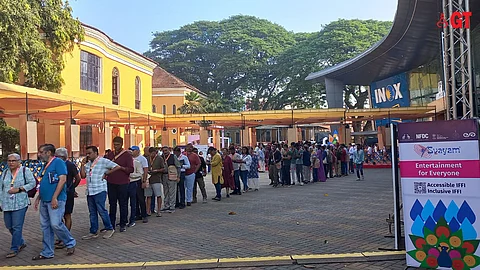

It’s not every day that you get a chance to watch a movie from India that has won the Grand Prix Award at the prestigious Cannes Film Festival, 2024, and which was in the competition section of the same festival for the first time in 30 years.
Yes, I am referring to the drama film All We Imagine as Light.
The movie was screened in the Accolades section of the ongoing 55th IFFI (International Film Festival of India), Goa.
The movie has done the rounds of various film festivals and has managed to win a few awards and rave reviews from across the world.
The movie is like poetry in motion where we find beauty in the everyday mundane through the lives of two nurses Prabha (Kani Kusruti) and Anu (Divya Prabha) and the hospital cook Parvati (Chhaya Kadam).
Writer/director of the movie Payal Kapadia is also a documentary filmmaker and her previous full-length documentary A Night of Knowing Nothing (2021) premiered at Cannes, Director’s Fortnight, where it won the Golden Eye for Best Documentary.
She starts All We Imagine as Light like a documentary. It features a voiceover of various migrant workers sharing their perspectives on the mega-city of Mumbai.
This sets the tone for the movie, which serves as an ode to migrant workers. The movie, in very subtle ways, makes us aware how our cities are made livable because of them, but we hardly acknowledge their presence.
Kapadia’s every frame conveys a powerful message about this theme—whether it’s the reflection of construction workers through a glass window as they build a skyscraper or the crowded local trains.
Despite winning such a prestigious honour at this year's Cannes Film Festival, there was surprisingly little buzz surrounding the movie at IFFI.
All these people come to Mumbai for a better life; but do they manage to get what they want? What about their desires and aspirations? The movie explores this theme through the lives of three women.
Prabha is a person of few words, grappling with loneliness as her estranged husband has migrated to Germany in search of employment. Vivacious Anu is navigating love through her affair with Shiaz (Hridhu Haroon), a Muslim boy, while Parvati is battling a real estate lobby to save her home.
They have to juggle these personal issues amidst demanding jobs, packed local trains and the relentless Mumbai rain.
However, a trip to a beach town offers them the opportunity to find a space for their desires to manifest.
Through these three female characters, Kapadia beautifully explores themes of sisterhood, the strength of female friendship and how women can find ways to navigate and cope with their circumstances.
At the screening, there was no recognition of the cast or crew, nor did the announcer mention that the film had won the Grand Prix at Cannes. The reasons for this are best known to the organisers.
The world is not a fair place, especially for women, but these three individuals face the world, not with anger, but with compassion and their idea of fun.
Along with its screenplay, the cinematography by Ranabir Das is remarkable and worthy of praise. His every frame is like a poem — be it the rain clouds, or blue sarees flying in the wind. Also, the background music plays beautifully amidst the hustle bustle of the metro city.
SAD STATE OF AFFAIRS
As mentioned before, despite winning such a prestigious honour at this year's Cannes Film Festival, there was surprisingly little buzz surrounding the movie at IFFI.
Delegates got to know about this movie only when they saw it in the movie screening schedule.
At the screening, there was no recognition of the cast or crew, nor did the announcer mention that the film had won the Grand Prix at Cannes. The reasons for this are best known to the organisers.
This is particularly notable since the movie has a Goa connection with Goan cinematographer and filmmaker Suyash Kamat serving as the director’s assistant and second unit cinematographer.
This was an opportunity lost.